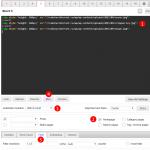Presentation on the topic of the information structure of modern man. Presentation on informatics "human information culture". Manifestation of information culture
slide 1
Description of the slide:
slide 2
Description of the slide:
Information revolution of the modern world A huge information potential has been accumulated in the world. The total amount of knowledge of mankind used to change very slowly, but already since 1900. it doubled every 50 years, by 1950. doubling occurred every 10 years, by 1970. - every 5 years, and since 1990. – annually. The process of fundamental transformation of the productive forces of society, caused by the increase in the use of knowledge in the production and the accelerated updating of information technology, was called the "Information Revolution".
slide 3
Description of the slide:
slide 4
Description of the slide:
slide 5
Description of the slide:
slide 6
Description of the slide:
Slide 7
Description of the slide:
Slide 8
Description of the slide:
Slide 9
Description of the slide:
Slide 10
Description of the slide:
Information processes Information processes - by definition federal law"On information, information technologies and information protection" dated July 8, 2006 - the processes of collecting, processing, accumulating, storing, searching and disseminating information. Information process - a set of sequential actions (operations) performed on information (in the form of data, information, facts, ideas, hypotheses, theories, etc.) to obtain any result (achievement of the goal). Information is manifested in information processes. Information processes always take place in some systems (social, sociotechnical, biological, etc.).
slide 11
Description of the slide:
slide 12
Description of the slide:
slide 13
Description of the slide:
Slide 14
Description of the slide:
slide 15
Description of the slide:
slide 16
Description of the slide:
Slide 17
Description of the slide:
Slide 18
Description of the slide:
Slide 19
Description of the slide:
Slide 20
Description of the slide:
slide 21
Description of the slide:
slide 22
Description of the slide:
slide 23
Description of the slide:
slide 24
Description of the slide:
Slide 25
Description of the slide:
slide 26
Description of the slide:
Slide 27
Description of the slide:
Slide 28
Description of the slide:
Slide 29
Description of the slide:
slide 30
Description of the slide:
Slide 31
Description of the slide:
Legal norms of information activity Federal Law No. 149-FZ of July 27, 2006 "On Information, Information Technologies and Information Protection" Adopted by the State Duma on July 8, 2006, approved by the Federation Council on July 14, 2006 Article 1. Scope of this Federal Law Article 2. Basic concepts used in this Federal Law Article 3. Principles legal regulation relations in the field of information, information technologies and information protection Article 4. Legislation Russian Federation on Information, Information Technologies and Protection of Information Article 5. Information as an Object of Legal Relations Article 6. Owner of Information Article 7. Public Information Article 8. Right of Access to Information Article 9. Restriction of Access to Information Article 10. Dissemination of Information or Provision of Information Article 11. Documentation of information Article 12. State regulation in the field of application of information technologies Article 13. Information systems Article 14. State Information Systems Article 15. Use of information and telecommunication networks Article 16. Information protection Article 17. Responsibility for offenses in the field of information, information technology and information protection Article 18. On the invalidation of certain legislative acts (provisions of legislative acts) of the Russian Federation 2) The Criminal Code of the Russian Federation dated 13 June 1996 N 63-FZ (as amended on 27 May, 25 June 1998, 9 February, 15, 18 March, 9 July 1999, 9, 20 March, 19 June, 7 August, 17 November, December 29, 2001, March 4, 14, May 7, June 25, July 24, 25, October 31, 2002, March 11, April 8, July 4, 7, December 8, 2003, July 21, 26, December 28, 2004, July 21, December 19, 2005, January 5, July 27, December 4, 30, 2006, April 9, May 10, July 24, November 4, December 1, 6, 2007, 14 February, April 8, 2008) Adopted by the State Duma on May 24, 1996, approved by the Federation Council on June 5, 1996 Chapter 28. Crimes in the field of computer information Article 272. Illegal access to computer computer information Article 273. Creation, use and distribution of malicious programs for computers Article 274. Violation of the rules for the operation of computers, computer systems or their networks 3) Law of the Russian Federation on the legal protection of programs for electronic computers and databases of September 23, 1992 No. 3523-I (as amended by the Federal Law of December 24, 2002 No. 177-FZ)
slide 32
Description of the slide:
The Internet is the main source of information 10 commandments of Internet etiquette 1. Remember the person! Do not forget that even through a dead network and a computer stuffed with electronics, you communicate with a living person. And often - with many people at the same time ... Do not let yourself be intoxicated by an atmosphere of anonymity and permissiveness - remember that on the other end of the wire is the same person as you ... When composing an email, imagine that you are saying all this directly to a person’s face - and try not to be ashamed of your words. 2. Follow the same rules online that you follow in real life. Violation of the laws of human communication, moral rules or norms public life Networks, perhaps, will pass for you with relative impunity ... But will your conscience be clear? 3.Remember that you are in cyberspace! Its boundaries are much wider than the boundaries of the human society we are used to, and different parts of it can have their own laws. Therefore, when faced with a new type of communication for you on the Web, study its laws and recognize their priority. Let's say every newsgroup, forum, or even IRC channel has its own, local rules - check them out before posting your first message! 4. Take care of the time and opinion of other people! Ask for help only when it is really necessary - and in this case you can always count on the help and support of your colleagues. However, do not pull other users over trifles - otherwise, in the end, they will simply stop communicating with you. 5. Try to look decent in the eyes of your interlocutors! Don't waste your time on "conventions" like good manners or, say, rules of grammar and spelling. Even compliments lose their weight and persuasiveness, being embodied in such a form: "Hey dude, I'm addicted to you and your books, write cool things" 6. Do not neglect the advice of experts and share your knowledge with others! Be grateful to those who spend their time answering your questions. But if you receive a letter with a question from another user yourself, do not rush to send this message to the wastebasket, no matter how ridiculous and naive it may seem. 7. Keep passions. No etiquette forbids entering into discussions, but do not stoop to swearing and swearing - even if your counterpart deliberately provokes you to do so. 8. Treat with respect not only to your own, but also to someone else's privacy! If for some reason you want to remain anonymous on the Web, recognize these rights for your interlocutor as well. Moreover - he has the right to anonymity and privacy, even if you speak "with an open visor." A side effect of this rule: do not publish information from your private letters without the consent of their senders, do not delve into other people's mailboxes and, ultimately, into other people's computers! Gentlemen hackers, this applies directly to you ... 9. Do not abuse your power and influence on the Web! It's hard to win trust, but it's so easy to lose it! 10. Be tolerant of the shortcomings of the people around you! Do not look at whether or not your interlocutors observe the rules of network etiquette, observe them yourself! In the end, very politely recommend the interlocutor to familiarize themselves with these rules ...
Description of the slide:
Literature Literature Makarova N.V. Program in Informatics (systemically - information concept). - St. Petersburg: Peter, 2004. - 64 p.: ill. Informatics and ICT. Textbook. Grade 11. Basic level / Ed. prof. N. V. Makarova. - St. Petersburg: Peter, 2008. - 224p. Journal "Computer Science and Education", 2007 - 2009. Big school encyclopedia, V. 1. Natural sciences (author - compiler of the section of computer science Simonovich S. V.). - M .: Russian Encyclopedic Partnership, 2004. - 704 p. Informatics and information technologies. Textbook for grades 10-11 / N. D. Ugrinovich. – M. : BINOM. Knowledge Laboratory, 2004. - 512p.: ill. List of recommended Internet resources http://www.bogomolovaev.narod.ru - Information on the theory and methodology of teaching informatics, the scientific organization of work of an informatics teacher, examples of lessons and extracurricular activities in computer science, entertaining tasks, etc. http://center.fio.ru - Website of the Moscow Center for Internet Education: "Distance Education", "Network Association of Methodists", "Issues of Internet Education" http://iatp.vspu.ac .ru/ch2000/doc/conceptl.doc - Information about the standard of teaching informatics at school http://www.ito.Su/l999/l/3/3115.html - Leveling and developing method of teaching informatics (I. N. Falina ). http://www.omsu.omskreg.ru - Methods of teaching computer science at school http://eclu.hl.ru/metodic/ - Methods of teaching computer science. Materials for students, teachers and teachers on the methodology of teaching computer science http://www.sch2.ru/kafedra/info - Methods of teaching computer science in high school http://www.ioso.ru/distant/ - Methods of distance learning http:/ /yz.firo.ru - The educational center Federal Institute for the Development of Education, 2006 http://tests.pp.ru - various tests http://www.ege.edu.ru - demo versions of the USE in computer science http://www.fipi.ru - questions related to the USE in computer science, demonstration versions of the exam. http://synopsis.kubsu.ru/informatic - the site is based on the publication of a textbook on computer science, edited by N.V. Makarova, provides versatile knowledge about the content and essence of the base of information culture, about state of the art and development trends computer technology, networks, software. http://psbatishev.narod.ru/test - computer science tests. http://www.yakutia.ru - theory in informatics.
Slide 35
INFORMATION CULTURE
Fundamentals of social informatics

By studying this topic, you will learn:
- what is the meaning of the concept of "information culture";
- how does the information culture of a person manifest itself;
- what are the main factors in the development of information culture.

Introduction
The information society is based on the intellect as a tool of cognition, on information as a result of cognition, on interest and activity in the perception of information, on the desire to apply the intellect and information for certain purposes.
New working conditions give rise to the dependence of the awareness of one person on the information acquired by other people. Therefore, it is no longer enough to be able to independently master and accumulate information, but it is necessary to learn such a technology for working with information when decisions are prepared and made on the basis of collective knowledge. This suggests that a person must have a certain level of culture in handling information. To reflect this fact, the term "information culture" was introduced.

- The concept of information culture is associated with two fundamental concepts - "information" and "culture", therefore, when defining the concept of "information culture", two aspects are distinguished: informational and cultural .

Informological approach
- As part of informological approach information culture is understood as a set of knowledge, skills and abilities of searching, selecting, storing, analyzing information, that is, everything that is included in information activities aimed at meeting information needs.

Cultural approach
Using cultural approach the content of the concept of "information culture" is expanding, since all the information accumulated by mankind is the property of world culture. In this regard, information culture is considered as a way of human life in information society as a component of the process of formation of human culture.

information culture
- This is the ability to purposefully work with information and use computer technology to receive, process and transmit it. information technology, modern technical means and methods.

Manifestations of information culture
- in specific skills to use technical devices, from telephone to personal computer and computer networks;
- in the ability to use in their activities computer information technology, the basic component of which are numerous software products;
- in the ability to extract information from various sources, both from periodicals and from electronic communication systems, to present it in an understandable form and be able to use it effectively;
- in possession of the basics of analytical processing of information;
- in the ability to work with various information;
- in knowing the features of information flows in their field of activity.

Factors in the development of information culture
- an education system that determines the general level of intellectual development of people;
- information infrastructure that determines the ability of people to receive, transmit, store and use information;
- the development of the country's economy, which determines the material possibilities of people using modern information technology: computers, televisions, electronic means of communication, etc.

test questions
1. How do you understand information culture?
2. Is information culture inherent in a person and/or society?
3. How is the information culture manifested?
4. What is the informological approach to the concept of "information culture" expressed in?
5. What is the cultural approach to the concept of "information culture" expressed in?
6. What are the main factors contributing to the development of an information culture?
7. Why in the formation of the required level of information culture plays an important role English language?

- Using various sources of information (reference books, dictionaries, the Internet, periodicals), write down all the encountered definitions or interpretations of the concept of "information culture" and analyze them.
- Analyze the concept of "culture" using various sources, and compare it with the concept of "information culture".
- Give examples of situations where a person must have a certain level of information culture.


Culture (lat. cultura cultivation, farming, education, veneration) is the area of human activity associated with the self-expression (cult, imitation) of a person, the manifestation of his subjectivity (subjectivity, character, skills, abilities and knowledge). That is why any culture has additional characteristics, as it is associated with both human creativity and everyday practice, communication, reflection, generalization and his daily life. Culture is a marker and basis of civilizations and the subject of study of cultural studies. Culture has no quantitative criteria in numerical terms. Dominants or features are sufficient to reflect the features of the culture. Most often, cultures are distinguished in periods of variability of dominant markers: periods and epochs, methods of production, commodity-money and production relations, political systems of government, personalities of spheres of influence, etc. latin cult of imitation of the subjectivity of character and the skills of knowledge as a marker of civilizations of cultural studies of periods of epochs of methods of production of production relations

"Culture is a complex that includes knowledge, beliefs, art, morality, laws, customs, as well as other abilities and skills acquired by a person as a member of society" (Edward Barnett Taylor)

"Culture is an information pool, and the individual is an active swimmer. From the point of view of evolutionary psychology, culture is a reservoir of various categories of information processed by the brain in various ways. The individual selects information units, "edits" them, modifies them, and, most importantly, uses them. ( Jerome Barkow)




Information culture characterizes the levels of development of specific societies, nationalities, nations, as well as specific areas of activity (for example, work culture, way of life, art culture). Information culture is inextricably linked with the second (social) nature of man. It is a product of his creative abilities, acts as the content side of subject-subject and object-object relations, registered with the help of various material carriers. (Sosnina T.N., Gonchukov P.N. Dictionary of interpretation of the concept of "Information" P.48)

Information culture is a field of culture associated with the functioning of information in society and the formation of information qualities of a person. (Vohrysheva M.G. Formation of the science of information culture // Problems of information culture: Collection of articles. Issue 6. Methodology and organization of information and cultural studies / Scientific editors: Yu.S. Zubov, V.A. Fokeev. - M.; Magnitogorsk, S. 57).

Information culture is the degree of perfection of a person, society or a certain part of it in all possible types of work with information: its receipt, accumulation, coding and processing of any kind, in creating on this basis a qualitatively new information, its transmission, practical use. (Semenyuk E.L. Information culture of society and the progress of informatics // NTI. Ser C.3).

Information culture is a qualitative characteristic of human life in the field of receiving, transmitting, storing and using information, where universal spiritual values are a priority. (Khangeldieva I.G. On the concept of "information culture" // Information culture of personality: past, present, future: International Scientific Conf., Krasnodar - Novorossiysk, September: Abstracts of reports - Krasnodar S.2).

Information culture is a level of knowledge that allows a person to freely navigate in the information space, participate in its formation and promote information interaction. (Medvedeva E.A. Fundamentals of information culture // Sotsis C.59).

Basic Standard general education in informatics and information technologyThe standard of basic general education in informatics and information technology is focused on mastering the skills of schoolchildren to organize their own information activities and developing skills in using ICT tools in everyday life, in learning activities further development of professions in demand in the labor market. Mastering the knowledge that forms the basis of scientific ideas about information, information processes, systems, technologies and models; Mastering the skills to work with various types of information using a computer and other means of information and communication technologies (ICT), organize their own information activities and plan their results; Development of cognitive interests, intellectual and creative abilities by means of ICT; Raising a responsible attitude to information, taking into account the legal and ethical aspects of its dissemination, selective attitude to the information received; Development of skills for using ICT tools in everyday life, in the implementation of individual and collective projects, in educational activities, and further development of professions that are in demand on the labor market.

















Skills and Qualities Needed for a 21st Century Person Responsibility and adaptability - personal responsibility and flexibility in various interpersonal, professional and social situations, setting high standards and goals for oneself and others, tolerance for other points of view. Communication skills - the ability to create conditions for effective oral, written, multimedia and network communication in various forms and contexts, managing it and understanding it Creativity and curiosity - the ability to self-development, applying new ideas and bringing them to other people, openness to new and diverse perspectives, points of view. Critical and systems thinking - the development of thinking that causes the commission informed choice; understanding the relationships in complex systems. Ability to work with information and media - the ability to find, analyze, manage, integrate, evaluate and create information in various forms and in various ways Interpersonal interaction and cooperation - the ability to work in a team, be a leader; take on different roles and responsibilities; work productively in a team; the ability to empathize; respect different opinions. Problem posing and solving skills - the ability to identify, analyze and solve problems. Focus on self-development - awareness of one's needs, monitoring one's own understanding and learning; search and placement of relevant resources; transfer of information and oversubject skills from one area of knowledge to another. Social responsibility - the ability to act in the interests of the community; behave ethically in interpersonal, professional and social contexts.


Memo on conducting research Choose one of the proposed topics and indicate the author Put a problematic question Put forward your hypotheses Think over the course of your research Arrange the results in the form of a table or diagram Draw conclusions Do not forget to indicate the literature used



References http://standart.edu.ru/catalog.aspx?CatalogId= mhttp:// m_resursy_po_predmetam/literatura/urok_litera tury_i_informacionnaja_kultura_uchenika/ http://rrc.3dn.ru/publ/cifrovye_obrazovatelnye _resursy_po_predmetam/literatura/urok_ikalitera tury_i_inuchenika

The world has accumulated a huge information potential.
The process of fundamental transformation of the productive forces of society, caused by the increase in the use of knowledge in the production and the accelerated updating of information technology, was called the "Information Revolution".
Informatization is one of the few, if not the only area of the economy, which, despite the current crisis situation in our society, is rapidly developing. This, apparently, is due to the fact that an increase in the content of information in any product makes it possible to spend less raw materials, energy and labor on its manufacture.
Information is the only unique type of resource that in the development of mankind is not only not depleted, but qualitatively improved. It does not require either simple or extended reproduction.
Information culture is the ability to purposefully work with information and use computer information technology, modern technical means and methods to receive, process and transmit it.
For free orientation in the information flow, a person must have an information culture as one of the components of a common culture. Information culture is associated with the social nature of man. It is a product of a variety of human creative abilities and manifests itself in several aspects:
in specific skills in the use of technical devices;
the ability to use computer information technology in their activities;
in the ability to extract information from various sources: both from periodicals and from electronic communications, to present it in an understandable form and be able to use it effectively;
in possession of the basics of analytical processing of information;
in the ability to work with various information;
in knowing the features of information flows in their field of activity.
Information processes - according to the definition of the Federal Law "On Information, Information Technologies and Information Protection" dated July 8, 2006 - the processes of collecting, processing, accumulating, storing, searching and disseminating information.
Information process - a set of sequential actions (operations) performed on information (in the form of data, information, facts, ideas, hypotheses, theories, etc.) to obtain any result (achievement of the goal). Information is manifested in information processes. Information processes always take place in some systems (social, sociotechnical, biological, etc.).
See the full text of the material Presentation "Information Culture" in the downloadable file.
The page contains a snippet.





